You searched for: tiktok%E9%82%80%E8%AF%B7%E7%A0%81%E5%A4%9A%E5%B0%91%E9%92%B1%20%E3%80%90%E8%B4%AD%E4%B9%B0%E7%BD%91%E5%9D%80tiktokads.cc%E3%80%91%E3%80%90tiktok%E8%8A%82%E7%82%B9%E6%90%AD%E5%BB%BA%EF%BC%8Ctiktok%E5%8F%98%E7%8E%B0%E4%BA%A4%E6%B5%81%E7%A4%BE%E7%BE%A4%EF%BC%8C%E5%87%BA%E5%94%AEtiktok%E9%82%80%E8%AF%B7%E7%A0%81%EF%BC%8Ctiktok%E5%B9%BF%E5%91%8A%E8%B4%A6%E6%88%B7%EF%BC%8CTiktok%E5%B9%BF%E5%91%8A%E4%BB%A3%E6%8A%95%EF%BC%88%E9%AB%98%E8%BD%AC%E5%8C%96%E7%8E%87%EF%BC%89%E3%80%8A%E5%87%BA%E5%94%AE%E7%BD%91%E5%9D%80tiktokads.cc%E3%80%8Btiktok%E5%B0%8F%E5%BA%97%E9%82%80%E8%AF%B7%E7%A0%81%E3%80%91Tiktok%E5%88%B7%E7%B2%89%E4%B8%9D
<< Previous | Displaying results 81-90 of 486 for "tiktok%E9%82%80%E8%AF%B7%E7%A0%81%E5%A4%9A%E5%B0%91%E9%92%B1%20%E3%80%90%E8%B4%AD%E4%B9%B0%E7%BD%91%E5%9D%80tiktokads.cc%E3%80%91%E3%80%90tiktok%E8%8A%82%E7%82%B9%E6%90%AD%E5%BB%BA%EF%BC%8Ctiktok%E5%8F%98%E7%8E%B0%E4%BA%A4%E6%B5%81%E7%A4%BE%E7%BE%A4%EF%BC%8C%E5%87%BA%E5%94%AEtiktok%E9%82%80%E8%AF%B7%E7%A0%81%EF%BC%8Ctiktok%E5%B9%BF%E5%91%8A%E8%B4%A6%E6%88%B7%EF%BC%8CTiktok%E5%B9%BF%E5%91%8A%E4%BB%A3%E6%8A%95%EF%BC%88%E9%AB%98%E8%BD%AC%E5%8C%96%E7%8E%87%EF%BC%89%E3%80%8A%E5%87%BA%E5%94%AE%E7%BD%91%E5%9D%80tiktokads.cc%E3%80%8Btiktok%E5%B0%8F%E5%BA%97%E9%82%80%E8%AF%B7%E7%A0%81%E3%80%91Tiktok%E5%88%B7%E7%B2%89%E4%B8%9D" | Next >>
-
Wilek (William) Loew describes forced labor in Lvov
Oral HistoryWilek was the son of Jewish parents living in the southeastern Polish town of Lvov. His family owned and operated a winery that had been in family hands since 1870. Wilek's father died of a heart attack in 1929. Wilek entered secondary school in 1939. Soon after he began school, World War II began with the German invasion of Poland. Lvov was in the part of eastern Poland annexed by the Soviet Union. Although the Soviets took over Wilek's home and the family business, Wilek was able to continue his…
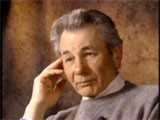
-
Hajj Amin al-Husayni: Arab Nationalist and Muslim Leader
ArticleHajj Amin al-Husayni claimed to speak for the Arab nation and the Muslim world and sought an alliance with the Axis powers during WWII. Learn more about his actions
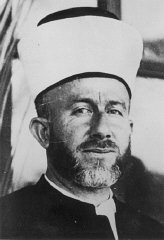
-
Hodonín U Kunštátu (Hodonín bei Kunstadt) (Roma camp)
ArticleIn March 1942, the Hodonin camp was classified as a camp for Roma. It was a transfer station during deportation to Auschwitz-Birkenau. Learn about the camp and its history.
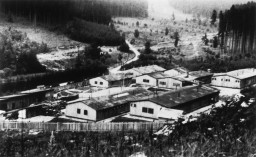
-
Mittelbau Main Camp: In Depth
ArticleLearn about conditions and forced labor in Dora-Mittelbau, the center of an extensive network of forced-labor camps for the production of V-2 missiles and other weapons.
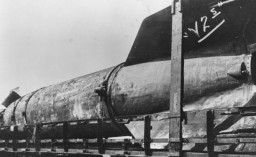
-
German air campaign in the Low Countries
FilmThe Junkers (Ju) 87, known as the "Stuka," spearheaded the Blitzkrieg ("lightning war") attacks that were decisive in the western campaign in 1940. Stuka dive-bombers closely supported German ground forces. They destroyed enemy strong points, aircraft, and airfields, and spread panic in rear areas. Although slow and easily shot down by Allied fighters, the Stukas proved devastatingly effective in the German invasions of Poland and western Europe, where Germany enjoyed superiority in the air. Stukas caused…
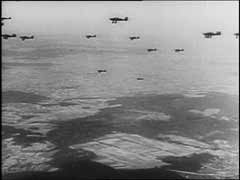
-
Stand Fast
SongErich Frost (1900–87), a musician and devout Jehovah's Witness, was active in the religious resistance to Hitler's authority. Caught smuggling pamphlets from Switzerland to Germany, he was imprisoned in the Sachsenhausen concentration camp near Berlin where he composed this song in 1942. Later deported to a labor camp at Alderney, Channel Islands, Frost survived the war and returned to Germany to serve the Watchtower Society. "Fest steht," reworked in English as "Forward, You Witnesses," is among the…
-
Coenraad Rood
ID CardCoenraad was born to a Jewish family in Amsterdam that traced its roots in the Netherlands back to the 17th century. After graduating from public school, Coenraad went on to train as a pastry maker at a trade school. But after completing his training at the age of 13, he decided for health reasons to change professions, and he began to study tailoring. 1933-39: Coenraad finished apprenticing as a tailor in 1937 when he was 20. Then he spent a year working as a nurse in a Jewish home for the permanently…
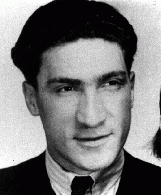
-
Hana Mueller Bruml describes her deportation to and arrival at Theresienstadt
Oral HistoryIn 1942, Hana was confined with other Jews to the Theresienstadt ghetto, where she worked as a nurse. There, amid epidemics and poverty, residents held operas, debates, and poetry readings. In 1944, she was deported to Auschwitz. After a month there, she was sent to Sackisch, a Gross-Rosen subcamp, where she made airplane parts at forced labor. She was liberated in May 1945.
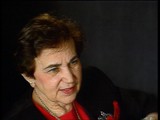
-
Jimmy Carter, Thomas Buergenthal, and Andrew Young
PhotoFrom left to right: former US President Jimmy Carter, Judge Thomas Buergenthal, former UN ambassador Andrew Young. Judge Buergenthal was the director of the human rights program for the Carter Center from 1986–89.

-
Columbia-Haus
ArticleThe Columbia-Haus camp was one of the early camps established by the Nazi regime. It held primarily political detainees. Learn more about the history of the camp.
